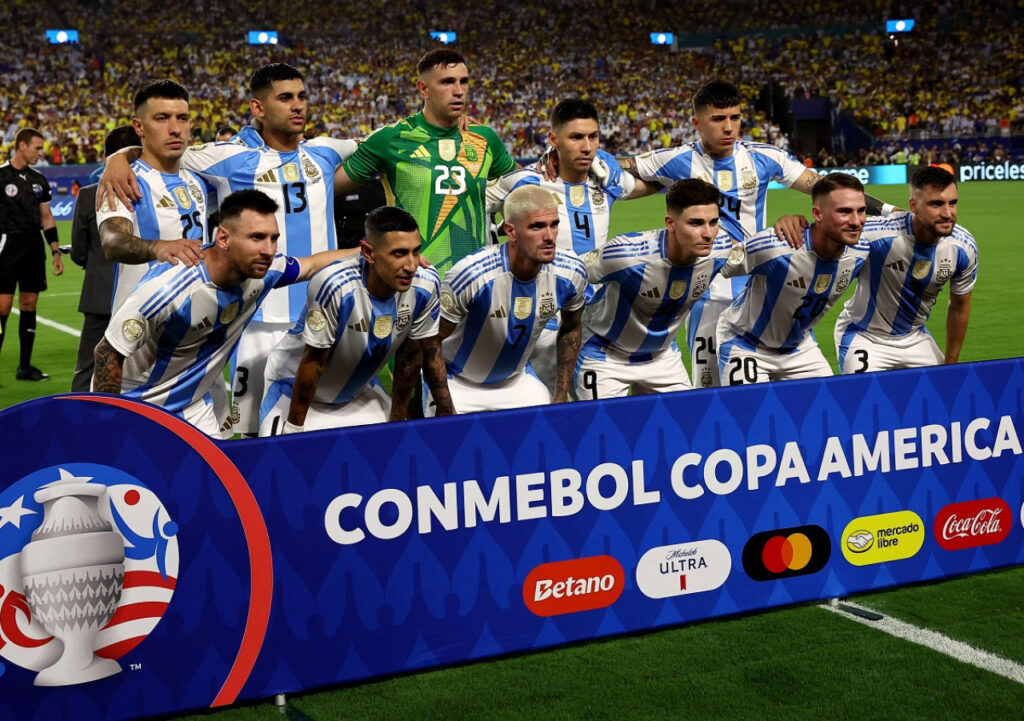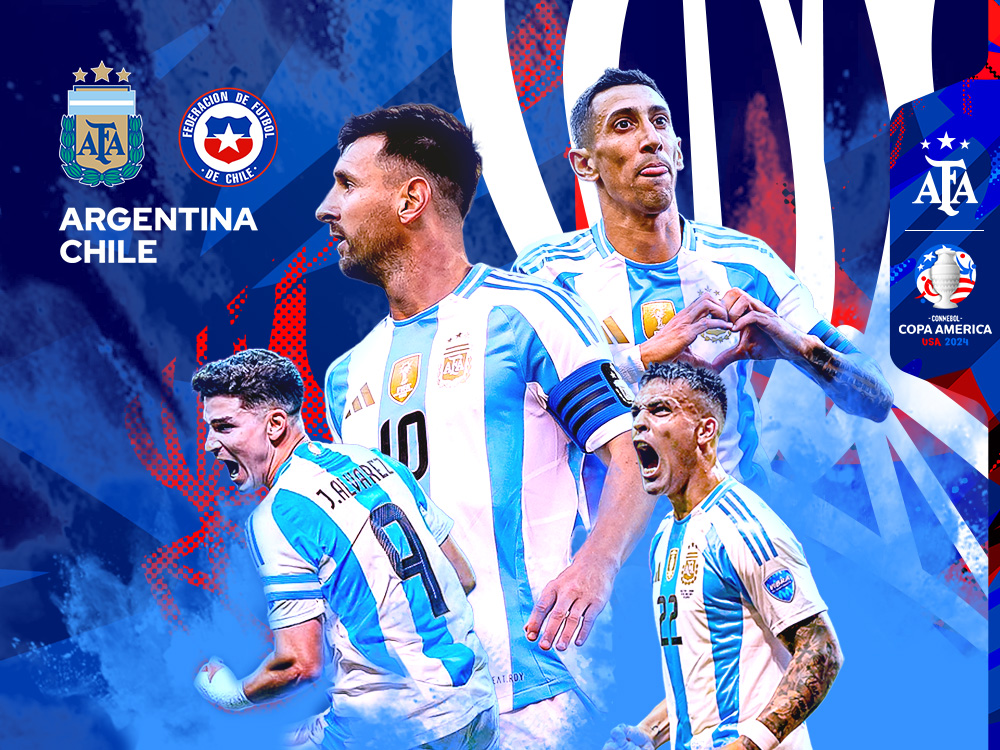
Argentina is the champion of Copa America: Those led by Lionel Scaloni beat Colombia 1-0 with a goal from Lautaro Martínez and repeat the title they won in Brazil in 2021.
Lionel Messi for Argentina and Argentina for Lionel Messi. All the joys that the number 10 brought to the Albiceleste this time had their return: a team with a musketeer spirit gave a new title to their number 10. With their captain injured and in tears on the substitute bench in the last 25 minutes of the second time, plus all the extra time, the world champion beat Colombia 1-0 in a dramatic final in Miami. It became a two-time champion of the Copa América.
The continental title won in Brazil 2021 was followed this Sunday by the victorious defence in the United States 2024, an edition marked by controversy from start to finish, also this Sunday in the run-up to the decisive match. If the Albiceleste had walked through a long desert until three years ago without titles, 28 between 1993 and 2021, now the Olympic laps only seem light blue and white.
You may also like: INDIA WINS THE T20 WORLD CUP
Argentina vs Colombia 2024, Argentina is the champion of Copa America:
The goal from Lautaro Martínez, the top scorer of the tournament with five goals, six minutes into the second extra time, unlocked a very close duel and gave a historic Argentine team an unprecedented triple title in South America: two Copa Américas (2021 and 2024 ) and a World Cup (Qatar 2022) in between. Only Spain, on the other side of the ocean, achieved a similar feat between 2008 and 2012, with two European Championships and a World Cup. Lionel Scaloni’s team also won another title played in a single match during this period, the 2022 Finalísima (3-0 against Italy at Wembley), also called the Conmebol-UEFA Champions Cup. Precisely, Argentina and Spain, the new European champions, will face each other in 2025 in a new edition between the continental kings.

The final had a break, the departure of Messi, injured, 20 minutes into the second half: the image of his right ankle swollen like a tennis ball reminded us of Diego Maradona in Italy in 1990. After a Copa América in which he tried to overcome biology – 37 years old -, a physical state that felt the lack of competitiveness of the MLS and the terrible playing fields in the United States, with the grass patched, on the 10th he went to the substitute bench in tears, in another moving postcard of the night.
Just as it happened to Cristiano Ronaldo in the last Euro Cup, Messi had already cried in the other Copa América final in the United States, in 2016 against Chile. For Argentines, a tournament in the United States seemed to have a tragic destiny: Diego Maradona finished his World Cup with one of his most iconic phrases, “They cut off my legs.” But the last image, however, would be happy, plethoric, with Messi once again lifting the Cup, sharing it with fellow veterans Ángel Di María and Nicolás Otamendi.
Di María’s amazing way to take retirement after winning the Copa America:

While the match marked the glorious end to Di María’s career in the Albiceleste, there are still two years left to confirm whether Messi, now 39 years old, will play in the 2026 World Cup, also in the United States, in which FIFA will have to review much of a Copa América that will remain in history for having been played with its back to football culture. In the middle, he will also have the Finalísima.
A wonderful Colombia, which had arrived at the final of the Cup as perhaps the best team in the Cup, also lived up to the final and had several chances to win, but Argentina showed that champions must be beaten by knockout. Néstor Lorenzo’s team also lost a historic 28-game undefeated streak. Soccer still owes a strong title to Colombia, continental champion only in 2001, at home. As a consolation, the reborn James Rodríguez – at 33 years old – was rightly chosen as the best player in the Cup.
Click on the below links to read the latest posts:
- IOS 18 IS GOING TO COME OUT TO IPHONES BUT WHEN?
- RRB NTPC RECRUITMENT 2024 NOTIFICATION IS OUT AND APPLY ONLINE.
- 9 OUT OF 10 ACCURATE US PRESIDENTIAL RESULTS PREDICTOR ALLAN LICHTMAN PICKS HIS CHOICE.
- A MAN SLEEPS ONLY 30 MINUTES A DAY AND DOING WHAT YOU DONT EXPECT
- RUSSIAN NUCLEAR MISSILE US RESEARCHERS FOUND NEW DEPLOYMENT SITE IN RUSSIA.
After the 83-minute delay in the last disorganization between Conmebol and the organizing country – this time to prevent the behaviour of South American fans – Colombia began the night according to what the event dictated: the most important match in its history. Argentina is a team inspired by a story by Jorge Luis Borges, a buddy, a cutter, difficult to intimidate, but even so, Lorenzo’s boys from Buenos Aires imposed their conditions at the beginning. In the first half, the game was played more as those in yellow wanted than those in light blue and white: the Colombians were playing the duel of their lives and in the second half, a final—the result: 45 minutes to watch with a cardiac Holter.
With Messi – at the physical limit throughout the Cup – surrounded, the match began to be played closer to Emiliano Dibu Martínez’s goal than to Camilo Vargas’ goal. James started well, incisive with qualifications for that lightning bolt called Luis Díaz, but in a duel of braves it was the ideal first half for a leader like Richard Ríos to stand out, the Palmeiras midfielder from Brazil who until the age of 18 was only a futsal player. He also showed how handsome Jefferson Lerma, his partner in the central circle, made the Aston Villa goalkeeper upset with shots from mid-range.
In that period, nothing was more dangerous than Jhon Córdoba’s header against the post, while Argentina boxed the game more than they played, always on guard, but also with the cunning of the champion who awaits his moment: that’s how Messi shot what seemed like a goal and the ball hit Julián Álvarez himself. All the drama that had occurred in the previous one was repeated when Messi suffered a blow – typical of the game, without bad intentions – from Santiago Arias and he was left lying for long seconds holding his right ankle: number 10 is not one for simulating pain and for a moment he feared for his continuity in the game, to the point that Lionel Scaloni sent Lautaro Martínez – the unexpected hero – to move as an eventual substitute.
However, Messi preferred to wait for the longest halftime in the world, 25 minutes, when Conmebol – in an unforgettable Copa América, and not for good – finished converting soccer into American football during his time in the United States: the recital Shakira’s show was a Super Bowl-style show, another local meddling in a sport that doesn’t need this type of show. It had not happened in the 1994 World Cup nor in the 2016 Copa América.
When the game returned, we had to remember that it was still 0-0, but then all the tension reached the areas: Colombia and Argentina had at least a couple of situations in the first 20 minutes to convert, including a handball from Davinson Sánchez in the area that neither the Brazilian referee Raphael Claus nor the VAR considered a penalty. Vargas also excelled against an attempt by Di María, in his last match for the Argentine national team, but the match found its break in Messi’s now permanent injury.
Here is the complete data of the most Copa America title winner:
| Team | Titles | Runners-up | Total finals |
|---|---|---|---|
| Argentina | 16 (1921, 1925, 1927, 1929, 1937, 1941, 1945, 1946, 1947, 1955, 1957, 1959, 1991, 1993, 2021, 2024) | 14 (1916*, 1917, 1920, 1923, 1924, 1926, 1935, 1942, 1959, 1967, 2004, 2007, 2015, 2016) | 30 |
| Uruguay | 15 (1916, 1917, 1920, 1923, 1924, 1926, 1935, 1942, 1956, 1959, 1967, 1983, 1987, 1995*, 2011) | 6 (1919, 1927, 1939, 1941, 1989, 1999) | 21 |
| Brazil | 9 (1919, 1922, 1949, 1989, 1997, 1999, 2004, 2007, 2019*) | 11 (1921, 1925, 1937, 1945, 1946, 1953, 1957, 1959, 1983, 1991, 1995, 2021*) | 20 |
| Paraguay | 2 (1953, 1979) | 6 (1922, 1929, 1947, 1949, 1963, 2011) | 8 |
| Chile | 2 (2015*, 2016) | 4 (1955*, 1956, 1979, 1987) | 6 |
| Peru | 2 (1939*, 1975) | 1 (2019) | 3 |
| Bolivia | 1 (1963*) | 1 (1997*) | 2 |
| Colombia | 1 (2001*) | 2 (1975, 2024) | 3 |
| Mexico | — | 2 (1993, 2001) | 2 |
Note:
- Titles marked with an asterisk (*) indicate shared titles (co-champions).
- The dashes (—) indicate no titles or runner-up positions.